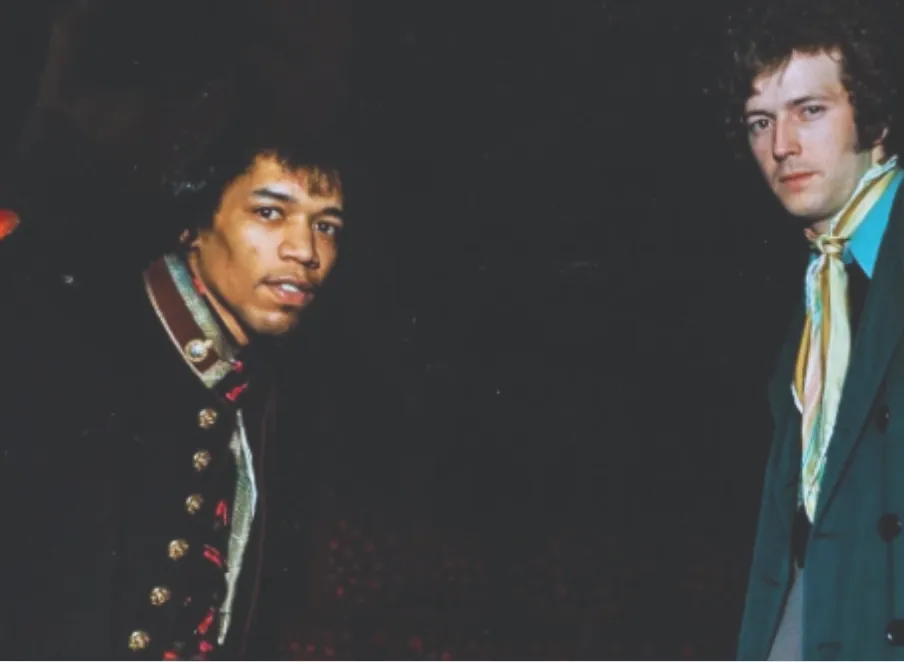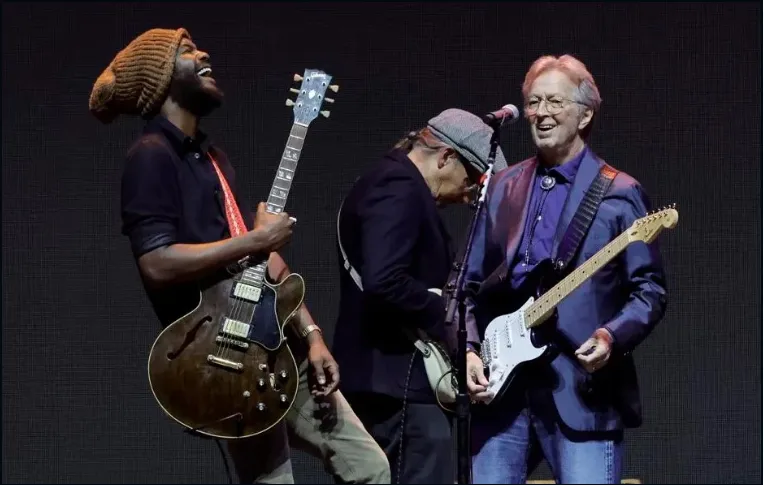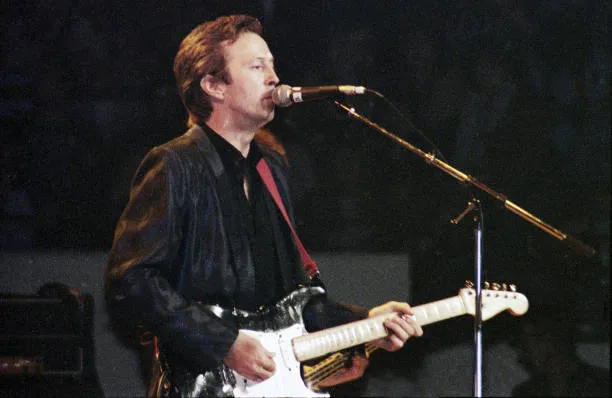In 2023, Rolling Stone named Eric Clapton as the 35th best guitarist of all time, a testament to the enduring impact of a musician whose career has spanned more than six decades.
As fans of Clapton, we applaud this accolade, recognizing the genius and influence of a guitarist who has left an indelible mark on the world of music.
Known affectionately as "Slowhand," Clapton's ability to combine technical virtuosity with deep emotional expression sets him apart in the pantheon of guitar greats.
Let's embark on a journey through Clapton's illustrious career, exploring his contributions, iconic moments, and why he remains a revered figure in the music world.
From Reginald Singson to "Slowhand"
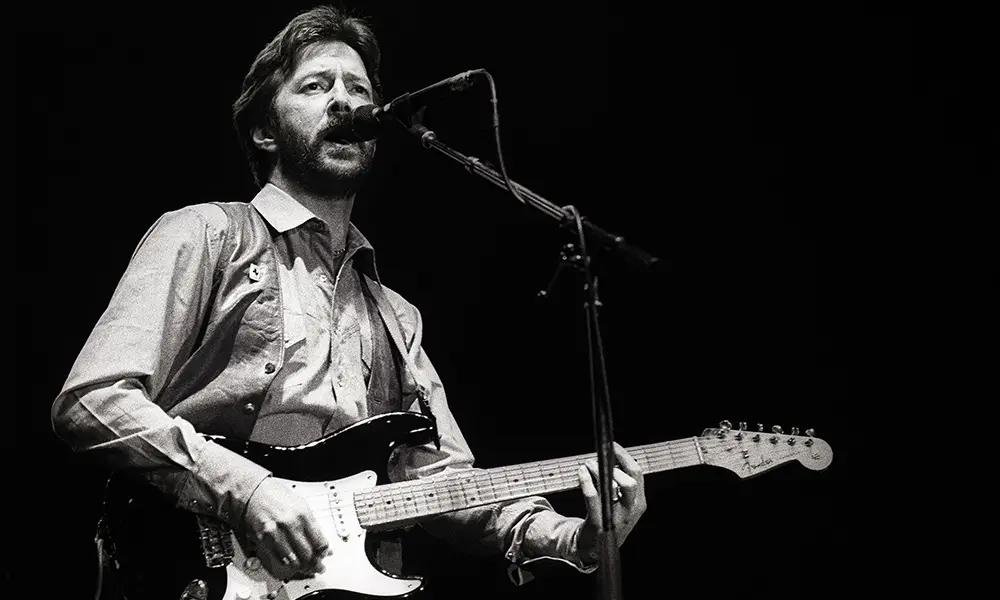
Eric Patrick Clapton was born on March 30, 1945, in Ripley, Surrey, England. Raised by his grandparents, Clapton was introduced to the guitar at an early age.
By the time he was a teenager, his natural talent for the instrument became evident.
His early influences included blues legends like Robert Johnson, Muddy Waters, and B.B. King, shaping Clapton's distinctive style that seamlessly blends blues, rock, and soul.
The Yardbirds and Bluesbreakers: Clapton's Initial Rise to Fame
Clapton's professional career took off in the early 1960s when he joined The Yardbirds, a British rock band that was making waves with its energetic and innovative sound.
With The Yardbirds, Clapton began earning a reputation as a formidable guitarist, captivating audiences with his fluid solos and improvisational skills.
Despite the band's commercial success, Clapton left The Yardbirds in 1965, feeling that their move towards a more pop-oriented sound was at odds with his own musical direction.
He subsequently joined John Mayall & the Bluesbreakers, a decision that would solidify his status as a leading figure in the British blues scene.
The 1966 album "Blues Breakers with Eric Clapton," often referred to as the "Beano Album" because Clapton was pictured reading a Beano comic on the cover, showcased his extraordinary blues guitar prowess and earned him the nickname "God" among his fans.
Cream: A Supergroup is Born
In 1966, Clapton co-founded Cream, a rock supergroup that also featured bassist Jack Bruce and drummer Ginger Baker. Cream's music was groundbreaking, characterized by its fusion of blues, rock, and psychedelia, and by extended instrumental jams that highlighted the virtuosity of its members.
Songs like "Sunshine of Your Love," "White Room," and "Crossroads" became anthems of the era, with Clapton's incendiary guitar playing at the forefront.
Cream's live performances were particularly notable for their improvisational brilliance, and Clapton's searing solos left a lasting impression on audiences and fellow musicians alike.
Although Cream disbanded in 1968, the band’s influence on rock music was profound and lasting.
Layla and Other Assorted Love Songs
Following Cream's breakup, Clapton formed the band Derek and the Dominos, releasing the seminal album "Layla and Other Assorted Love Songs" in 1970.
This album, often regarded as one of the greatest rock albums of all time, featured the iconic track "Layla," a song inspired by Clapton’s unrequited love for Pattie Boyd, then wife of George Harrison.
"Layla" stands as a testament to Clapton's musical genius, its unforgettable riff and emotive solo capturing the pain and passion of unfulfilled love.
The double-length album also included other gems like "Bell Bottom Blues" and "Keep on Growing," showcasing the band's remarkable chemistry and Clapton's exceptional songwriting and playing.
Challenges and Comebacks: Clapton's Solo Career and Personal Struggles
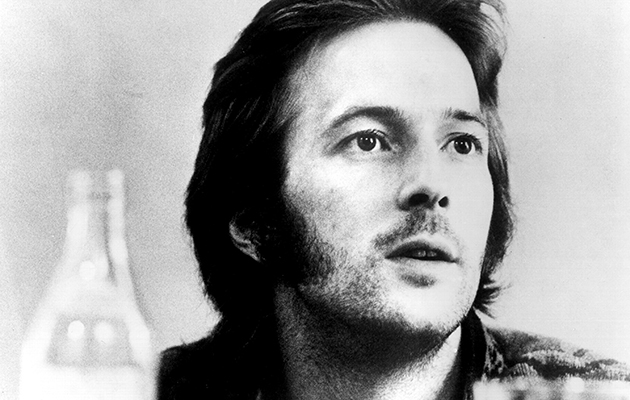
The 1970s and 1980s saw Clapton navigating both artistic successes and personal challenges.
His solo career took off with hits such as "After Midnight," "I Shot the Sheriff," and "Wonderful Tonight," further cementing his place in rock history.
However, his journey was also marked by battles with addiction, which affected his personal life and work.
Despite these struggles, Clapton's music continued to evolve. The 1992 release of his "Unplugged" album, featuring acoustic renditions of his classics and the poignant "Tears in Heaven," marked a significant comeback.
"Tears in Heaven," written in the aftermath of the tragic death of his son Conor, remains one of Clapton’s most touching and emotionally resonant songs.
Eric Clapton's Guitar Style

What sets Eric Clapton apart as an extraordinary guitarist is not just his technical skill, but his ability to convey deep emotional nuance through his playing.
Clapton’s style is characterized by his use of bends, vibrato, and his masterful phrasing. His tone, often achieved using his trademark Fender Stratocaster, known as "Blackie," is both sharp and soulful.
Clapton’s improvisational approach allows him to create spontaneous, yet coherent and musical, solos that capture the listener’s attention.
This ability to blend technical proficiency with heartfelt expression is what makes his solos unforgettable, leaving a lasting impression with each performance.
Clapton's Expansive Musical Journey
Throughout his career, Clapton has collaborated with a diverse range of artists, further expanding his musical horizons.
His work with figures like B.B. King, J.J. Cale, and Bob Dylan has not only highlighted his versatility but has also introduced elements from different musical traditions into his repertoire.
His collaboration with B.B. King on the 2000 album "Riding with the King" is a noteworthy example.
The album, which won a Grammy Award, is a celebration of blues music and features both artists at their best, blending their unique styles into a cohesive and captivating collection of songs.
Awards and Honors
Eric Clapton's contributions to music have been recognized with numerous awards and honors.
He is a three-time inductee into the Rock and Roll Hall of Fame: as a member of The Yardbirds, Cream, and as a solo artist. These inductions speak to his influence and impact across different phases of his career.
In addition to his Rock Hall inductions, Clapton has received 18 Grammy Awards, and countless other accolades, acknowledging his artistry and achievements.
Rolling Stone’s 2023 ranking of Clapton as the 35th best guitarist of all time is yet another testament to his enduring significance in the world of music.
Why We Cherish Clapton's Music?
As the Jervis Family, we have always cherished Eric Clapton's music for its ability to touch the soul and provide comfort, joy, and reflection.
Clapton’s music has been a staple at our family gatherings, road trips, and quiet evenings, providing a soundtrack to many of our cherished memories.
One particularly unforgettable experience was attending one of Clapton’s live performances, where we witnessed first-hand the magic of his guitar work.
The energy and emotion of his playing were palpable, creating a connection that went beyond mere entertainment—it was a shared experience that left a lasting impression on all of us.
The Future of Clapton's Legacy
Eric Clapton’s influence shows no signs of waning. His ongoing commitment to music, as seen in recent performances and recordings, keeps him relevant to both long-time fans and new audiences.
His willingness to explore different musical styles and collaborate with a diverse array of artists ensures that his legacy will continue to evolve and inspire future generations.
Eric Clapton's recognition by Rolling Stone as the 35th greatest guitarist of all time is a well-deserved accolade for a musician whose impact on music is profound and far-reaching.
Clapton’s combination of technical brilliance, deep emotional expression, and unwavering dedication to his craft sets him apart as a truly unique artist.
Eric Clapton is not just a guitarist; he is a storyteller, an innovator, and an inspiration.
